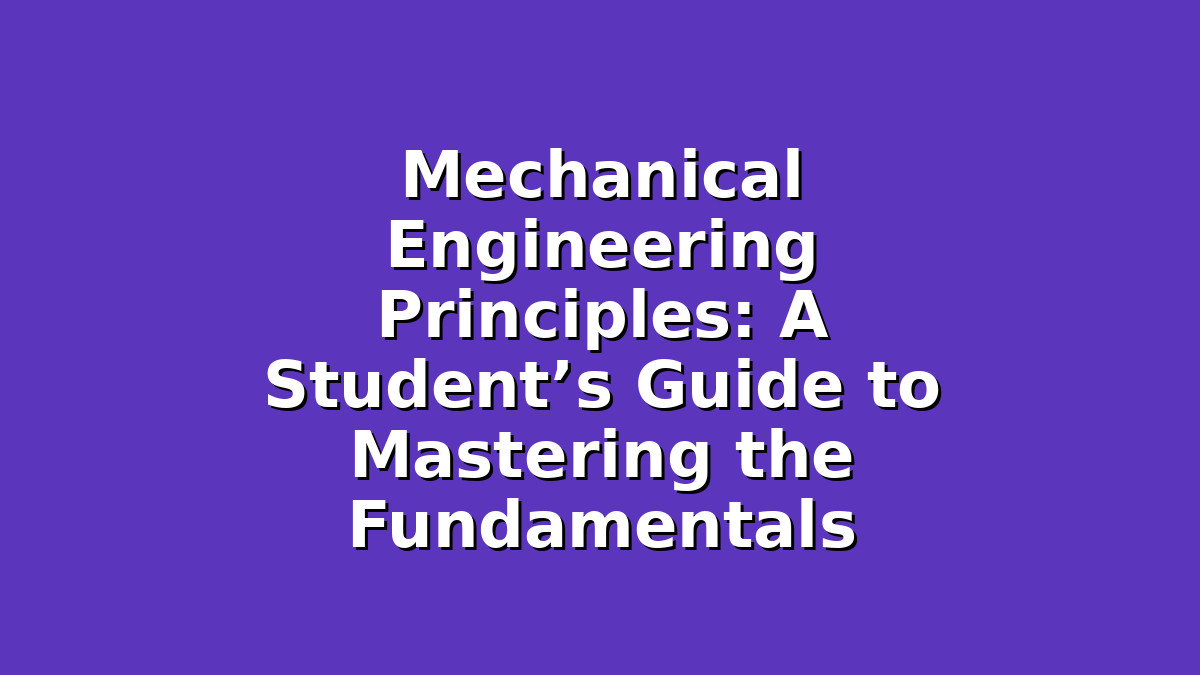Mechanical engineering is a broad and dynamic field that forms the backbone of many industries, from automotive and aerospace to manufacturing and energy. For students preparing for exams or aiming to strengthen their understanding, grasping the core mechanical engineering principles is essential. These principles not only help you solve complex problems but also lay the foundation for advanced topics and real-world applications.
In this article, we will explore key mechanical engineering principles and offer practical study tips tailored to help you excel in your coursework and exams. Whether you’re a beginner or looking to refine your skills, this guide will provide the motivation and strategies you need to succeed.
1. Understand the Core Concepts Thoroughly
Mechanical engineering covers a wide range of topics including mechanics, thermodynamics, fluid dynamics, materials science, and control systems. To build a solid foundation:
– Focus on Fundamental Laws: Start by mastering Newton’s laws of motion, the laws of thermodynamics, and principles of fluid flow. These laws are the building blocks for solving engineering problems.
– Use Conceptual Visualizations: Draw diagrams, free body diagrams, and flow charts to visualize forces, energy transfers, and system behavior. Visual learning helps internalize abstract concepts.
– Relate Theory to Real-world Applications: Try to connect theoretical concepts with everyday machines and devices. For example, when studying heat transfer, think about how a car radiator or a refrigerator works.
Study Tip: Create summary notes for each principle, highlighting formulas, key definitions, and examples. Regularly revisiting these notes will reinforce your understanding and boost recall during exams.
2. Develop Problem-Solving Skills Through Practice
Mechanical engineering exams often test your ability to apply principles to solve numerical and conceptual problems. Building problem-solving skills is crucial:
– Start with Simple Problems: Begin your practice with fundamental problems that focus on individual concepts before progressing to complex, multi-step scenarios.
– Work on Past Exam Papers: Practicing previous years’ questions familiarizes you with common exam patterns and time management.
– Break Problems into Smaller Parts: Analyze what is given, what needs to be found, and which principles or formulas apply. Breaking down problems reduces overwhelm and improves accuracy.
– Use Step-by-Step Solutions: When solving problems, write out every step neatly and logically. This habit helps track your thought process and makes it easier to identify mistakes.
Study Tip: Form or join study groups where you can discuss challenging problems. Explaining your approach to peers and hearing theirs can deepen your understanding and reveal new methods of solving problems.
3. Leverage Technology and Supplementary Resources
In today’s digital age, there is a wealth of resources available to mechanical engineering students beyond textbooks:
– Online Tutorials and Lectures: Platforms like Khan Academy, Coursera, and YouTube have free courses and tutorials explaining mechanical engineering topics in detail.
– Simulation Software: Tools like MATLAB, SolidWorks, and ANSYS allow you to model mechanical systems and visualize concepts such as stress distribution or fluid flow. Hands-on experience with simulations can solidify theoretical knowledge.
– Educational Apps and Flashcards: Use apps for formula revision and quick quizzes to test your knowledge regularly. Flashcards help in memorizing key formulas and definitions.
– Textbooks and Reference Books: While standard textbooks are essential, consider supplementary books that offer different explanations or additional practice problems.
Study Tip: Create a balanced study schedule combining theory, problem-solving, and practical simulations. Allocate specific times for reviewing videos or tutorials to prevent passive learning and ensure active engagement.
Conclusion
Mechanical engineering principles are the foundation upon which your academic and professional success will be built. By focusing on understanding core concepts, practicing problem-solving diligently, and utilizing modern technological tools, you can develop a strong command over the subject. Remember that consistency and a positive mindset are your best allies during exam preparation. Don’t hesitate to seek help when needed, collaborate with peers, and stay curious about how mechanical engineering shapes the world around us.
With the right approach and dedication, mastering mechanical engineering principles becomes an achievable and rewarding goal. Keep pushing forward, and you’ll not only ace your exams but also prepare yourself for a bright future in engineering.

Responses